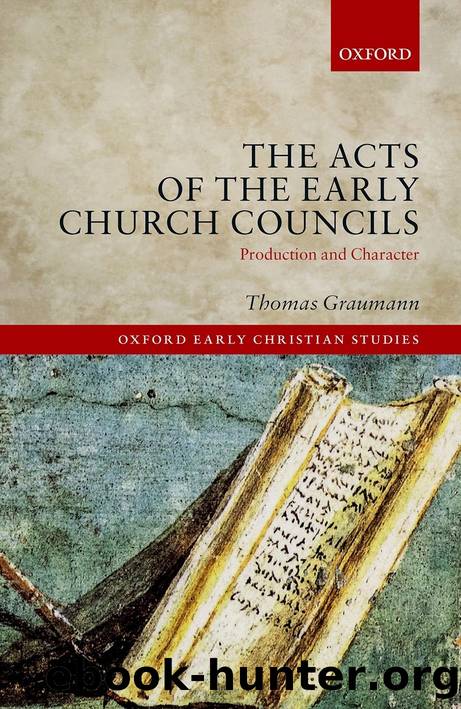The Acts of the Early Church Councils by Thomas Graumann;

Author:Thomas Graumann; [Graumann, Thomas]
Language: eng
Format: epub
ISBN: 9780192638557
Publisher: OUP Premium
Published: 2021-07-05T00:00:00+00:00
10
âTransferringâ Shorthand Notes to Longhand Transcript
The assessment that specific statements represented the voice of the entire council is expressed in the protocols in the form of a short narrative phrase that introduces the words recorded: âthe holy council saidâ. While Aetius had appealed to the convention to use this form of words in defence of the recording practice, he had also sought to claim written acceptance of the verdict as their decisive eventual âverificationâ. The transferral from recorded shorthand notes into longhand transcription provides the critical hinge between the two. Identifying the voice of âthe councilâ at the point of stenographic notation represented only a preliminary judgement by the secretaries. The process of transcription allowed one either to amend or to confirm it. The decisive introductory ânarrativeâ statements, however short and formulaic, received their definite wording only at this stage, as the following examples reveal.
One potentially decisive element in the precarious equilibration of working practices at different times normally proves elusive: the shape and meaning of the original stenographical notes inscribed on the wax tablets during live meetings. We have no access to the system of abbreviations and signs in which statements in Ephesus and Chalcedon were probably taken down, nor are any of the physical objects carrying such notes extant. Indirectly, however, a glimpse into the relationship between stenographic signs and their transferral into longhand script may be afforded by the exchange at the Conference of Carthage, already briefly discussed, about the two versions of raw notes, which the Donatist notaries and civil exceptores respectively had created. During the second meeting at Carthage two tachygraphers âreadâ their stenographic notes to the assembly. To this we can compare the form of words eventually transcribed into the relevant official protocol (not yet finished at the time).
The finalized official protocol of the first meeting (a passage of which the stenographers read out in their raw, shorthand notes) introduces the disputed statement thus:
Marcellinus, uir clarissimus, tribunus et notarius dixit: [there follows his statement].1
The same formula is used twice more after a few lines, on each occasion when the chairman speaks. It is the standard formula used at all times in the protocol to designate him as speaker. Interestingly, the versions read (on the second day) from the stenographic tablets of the Donatist and civil stenographers differ precisely in their designations of the speaker, whereas further comparison reveals that in all other respects identical recording of the words uttered by all speakers involved in the relevant exchanges.
The civil exceptor Martialis âreadsâ the disputed passage from his teamâs stenographic notes as follows: âNobilitas tua dixit [there follow the words of Marcellinus]â. On the second occasion, only moments later the same phrase is used again: âNobilitas tua dixitâ; and immediately thereafter âSublimitas tua dixitâ. The other two speakers participating in the original exchange are identified by him like this: âAlypius, episcopus ecclesiae catholicae dixitâ; and the response âAdeodatus episcopus dixitâ.2 When both parties agreed to the postponement of proceedings, his notes introduce their words: âAb utrisque partibus dictum estâ.
Download
This site does not store any files on its server. We only index and link to content provided by other sites. Please contact the content providers to delete copyright contents if any and email us, we'll remove relevant links or contents immediately.
Phoenicians among Others: Why Migrants Mattered in the Ancient Mediterranean by Denise Demetriou(606)
american english file 1 student book 3rd edition by Unknown(605)
Verus Israel: Study of the Relations Between Christians and Jews in the Roman Empire, AD 135-425 by Marcel Simon(590)
Caesar Rules: The Emperor in the Changing Roman World (c. 50 BC â AD 565) by Olivier Hekster(571)
Basic japanese A grammar and workbook by Unknown(571)
Europe, Strategy and Armed Forces by Sven Biscop Jo Coelmont(520)
Give Me Liberty, Seventh Edition by Foner Eric & DuVal Kathleen & McGirr Lisa(497)
Banned in the U.S.A. : A Reference Guide to Book Censorship in Schools and Public Libraries by Herbert N. Foerstel(488)
The Roman World 44 BC-AD 180 by Martin Goodman(478)
Reading Colonial Japan by Mason Michele;Lee Helen;(467)
DS001-THE MAN OF BRONZE by J.R.A(462)
Introducing Christian Ethics by Samuel Wells and Ben Quash with Rebekah Eklund(455)
Imperial Rome AD 193 - 284 by Ando Clifford(454)
The Oxford History of World War II by Richard Overy(453)
The Dangerous Life and Ideas of Diogenes the Cynic by Jean-Manuel Roubineau(451)
Catiline by Henrik Ibsen--Delphi Classics (Illustrated) by Henrik Ibsen(426)
Language Hacking Mandarin by Benny Lewis & Dr. Licheng Gu(409)
Literary Mathematics by Michael Gavin;(407)
Brand by Henrik Ibsen--Delphi Classics (Illustrated) by Henrik Ibsen(389)
